| Chef Gordon Ramsay is very sceptical about historical recipes – he just doesn’t believe they actually work! Ever Wondered sends him to find out more at a 15th century farmstead, a part of the Weald and Downland Open Air Museum near Chichester… |
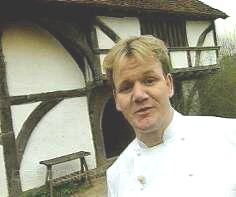 |
Food: how modern is the modern British menu? was
originally
presented and is the property of the BBC, Ever Wondered, & Open
University. We encourage you to primarily visit their original
version of this page, and to use this page only if the
original
cannot be accessed.
____________________________________________________________
Food: how modern is the modern British menu?
| Chef Gordon Ramsay is very sceptical about historical recipes – he just doesn’t believe they actually work! Ever Wondered sends him to find out more at a 15th century farmstead, a part of the Weald and Downland Open Air Museum near Chichester… |
 |

Richard Fitch is a professional freelance
food historian, |
Gordon: Richard – do these recipes work?
Richard Fitch: They certainly do, and there’s plenty to be learned from medieval and Tudor recipes, even for a modern chef such as yourself. The first dish we’re going to make is beef pottage. |
BEEF POTTAGE WITH WHOLE HERBS
Mix the oatmeal with 1/2 pint of cold water, and stir it into the pot.
Add the vegetables, and continue simmering for 1 1/2 hours, until the meat is tender. Then add the salt and wine vinegar.
Lift the meat out on to a dish, lift out the vegetables with a
skimmer,
lay them on top, and decorate the edges with the pieces of bread. Then
keep them warm until the remaining stock has been served first as a
pottage.
| Richard Fitch: There’s no stated cooking time – the beef
is basically
poached until it’s done. The dish that comes out is boiled beef. Served
sliced and accompanied by a thickened vegetable stew like a broth, but
a little bit thinner. In modern terms it's two courses in one pot.
|
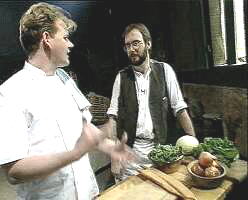 Gordon: Do you season it before cooking? Richard Fitch: No. The thing you have to realise is the limited quantity and availability of seasoning at the time. A small amount of salt, a very expensive commodity then, would have been added toward the end of the cooking process. The most common seasoning in Britain in the Middle Ages was mustard. Pepper was also used, but to give you an idea of how precious it was, in a household of 20 staff consumption of pepper would have been less than a quarter of a teaspoon per person per week! |
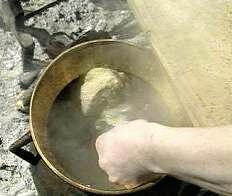 |
Gordon: Unbelievable! What about vegetables….surely they
can’t have
changed very much over 400 years?
Richard Fitch: No. Basic vegetables are basic vegetables. The kind of things they didn’t have would have been imports from the New World and the Americas. In the 15th century and earlier, vegetables were seen as the preserve of the poor. The rich, if they did cook vegetables, would have boiled them to death and thrown away the water, losing all their goodness. What we also find 400 years ago is that we were very reliant on what we’d stored over the winter. The household would have smoked a large amount of meat – slaughtering the pigs in the autumn, keeping a little bit of fresh meat, but preserving as much as possible as it had to last all the way through until the next year. |
Though the meat is very tender Gordon finds the taste and texture pretty disgusting – like cold porridge with a slight seasoning of salt! In the hopes of finding something more suitable to the modern palate he moves on to find out about mid-17th century puddings…
| Richard Fitch: We’re going to make quite a sweet dish – sack posset, or thick alcoholic pudding. The dish includes certain spices – some mace, cinnamon and nutmeg. These spices become more common the closer you come to the present day. |
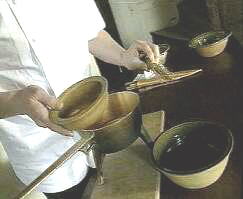 |
| In the 15th century they would have been purely the preserve of the social elite. By the time we reach the mid-1600s they’re becoming more available to the town class. |
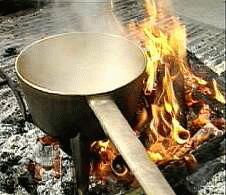 |
SACK POSSET
Gordon thinks this is the best thing he’s tasted all day! Inspired to find out more about herbs and their uses in cooking he visits the Chelsea Physic Garden to get the expert opinions of herbal pharmacologist Andrew Chevallier…
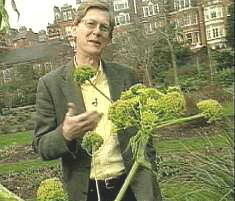
Andrew Chevallier is a lecturer on Herbal Medicine at Middlesex University. He is also a member of the National Institute of medical herbalists |
Andrew Chevallier: Food and herbs were very important in
recipes
at the time. All they had was their fields, their gardens – food and
medicine
went hand in hand, and people were using food and herbs to treat
infection
from Roman times right up to the middle ages. People then thought there
were four humours which were responsible for health in the body –
blood,
black bile, yellow bile and phlegm. You stayed healthy as long as those
four humours were in balance.
Gordon: So which herbs do what? Andrew, if I had an upset stomach, how would I have been treated? Andrew Chevallier: That would be too much yellow or black bile. Globe artichoke is very good to protect the liver and lower blood fat levels. Sage is very good for digestion and helps to strengthen the stomach’s action. |
Gordon: If I had a bad chest…coughs and colds?
Andrew Chevallier: That would be too much yellow or black bile. Globe artichoke is very good to protect the liver and lower blood fat levels. Sage is very good for digestion and helps to strengthen the stomach’s action.
Gordon: If I had a bad chest…coughs and colds?
Andrew Chevallier: Too much phlegm. Thyme is very good for the chest and soothes dry, irritating, tickly coughs. Garlic as everyone will know is a natural antibiotic and is very good for chest infections.
Gordon: What if I’m stressed out and uptight – not difficult in my job?
Andrew Chevallier: Hops are a good strong sedative. Rosemary is best known as a culinary plant these days – but its also a good invigorating tonic and promotes energy. If you’re full of nervous energy it’ll help you relax.
Gordon rounds off his day of research by taking the ideas he’s
learned
and adding a dash of modern culinary technique…why not try his recipe:
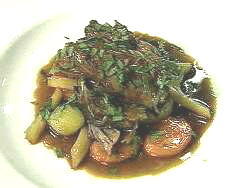 |
RECIPE COMING SOON! |
____________________________________________________________
If you would like to find out more about the history of food you might try these suggestions :
Books you can read
"The Art of Dining", Sara Paston Williams, The National Trust, ISBN 0707803608
"Food and Cooking in 18th-Century Britain", Jane Renfrew, English Heritage, ISBN 1850745382
"Food and Feast in Medieval England", P.W Hammond, Sutton Publishing, ISBN 0750909927
"Herbs for Common Ailments", Anne McIntyre, Gaia Books, ISBN 1856750558
"The Royal Horticultural Society Encyclopedia of Herbs and Their Uses", Deni Brown, Dorling Kindersley, ISBN 0751302031
"English Herb Gardens", Guy Copper, Weindenfield & Nicolson General, ISBN 0297791311
Links You Can Surf
http://www.herbsociety.co.uk For more information on the Herb Society
http://www.ex.ac.uk/phytonet For more information on the British Herb Association
http://www.dine-online.co.uk/Britcook.htm For more information on the history of British cooking and where to find traditional British food
http://www.godecookery.com/godeboke/godeboke.htm For more information on medieval cooking and recipes
If you think you might be interested in studying more about these
subjects,
find out what the Open
University has to offer.
Ever
Wondered Homepage
____________________________________________________________
Be sure to visit the original version of this page:
http://www.open2.net/everwondered1/food/topic1.htm
RETURN TO: A Boke of Gode Cookery
Please visit The Gode Cookery Bookshop